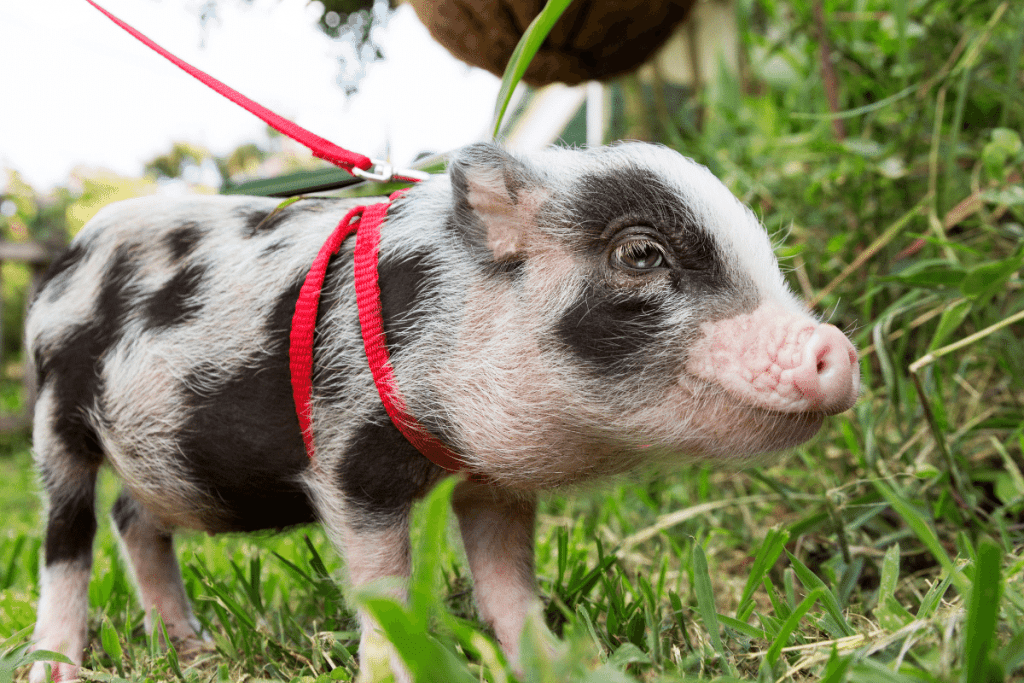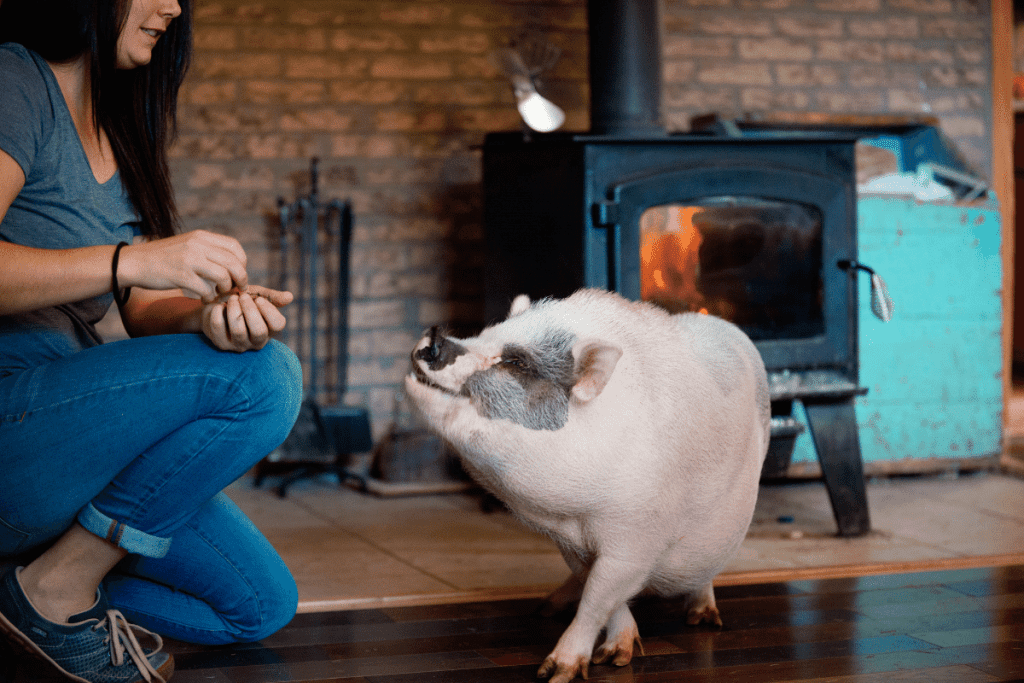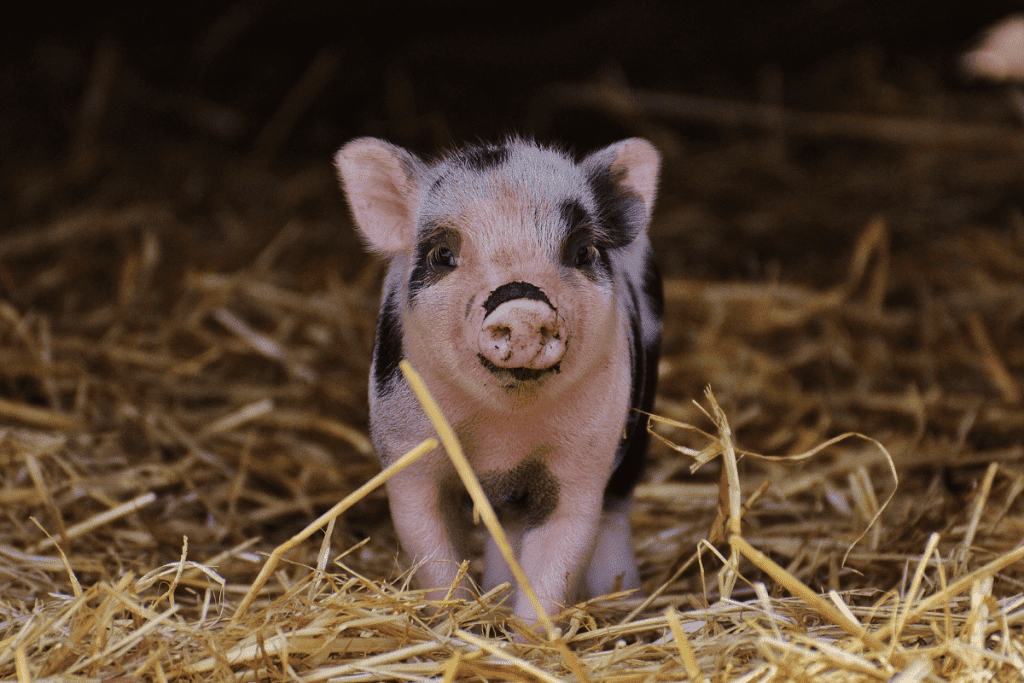Pigs can make excellent pets when raised in an environment healthy and safe for them.
But it is essential to thoroughly research how to take care of a pet pig before you adopt one.
There are many factors to consider when learning to care for a newly adopted pet pig.
To properly care for a pet pig, it’s essential to understand their dietary, exercise, and training needs. Additionally, it is critical for the pig’s living space to be safe and healthy for them.
If you are considering adopting a pig as a pet, there is a lot of information you’ll need to consider as part of the process.
You might be wondering how much work it is to take care of a pet pig, where to adopt a pet pig, and what special care pigs require.
Read on to find out the answers to these questions and more!

Table of Contents
ToggleWhat Are the Essentials of Caring for a Pet Pig?
There are many aspects of raising a pet pig any pet parent will need to know about to give their pet the love and care they require.
Additionally, there are laws in many countries protecting animal rights and ensuring they live in suitable conditions.
This section will cover the basics of pet pig care, how to choose an appropriate pig as a pet, and give you an overview of zoning laws in the United States and the Animal Welfare Act in the United Kingdom.
What Types of Pigs Make Good Pets?
When most people imagine having a pet pig, they think of “mini” pigs.
“Mini pig” does not refer to a specific breed of pig but instead describes a group of several species of small pigs, including pot-bellied pigs.
These pigs range from 75 lbs to 150 lbs when full-grown, unlike full-sized pigs, which can reach 700 lbs or more.
Because of their small body size, these pigs require fewer resources than full-sized pigs, making it easier to raise them as pets.
However, even mini-pigs require many resources to live a healthy life.
For the rest of this article, we’ll focus on these mini pigs and their needs rather than full-sized pigs.
How Much Space Do Mini Pigs Need to Thrive?
The RSPCA in the United Kingdom recommends a minimum of 390′ square feet of space per pig.
This is the first factor you need to consider when deciding whether to adopt a pet pig.
Pigs need plenty of exercise and require an extended period outside every day.
Most people do not have such large spaces in their homes, especially in apartments or condos.
However, if you have a large backyard, you may be able to house a pig with no problem.
What Do Mini Pigs Eat?
Mini pigs should be fed pig feed and pig feed only.
While you may be tempted to give them scraps from the table or feed them dog or cat food, these do not provide the balanced diet pigs need.
You may give your pig healthy treats like vegetables and fruit in small amounts from time to time.
However, their daily diet should be feed explicitly made for pigs.
Pigs should be fed two to three times per day, with the amount of food per day equal to about 2% of their total body weight.
Where Do Mini Pigs Use the Bathroom?
Mini pigs may be trained to poop in specific places in your yard or even in litter boxes.
Pigs don’t like to poop near where they enjoy spending time or near where they eat, so make sure you give them adequate space in which to relieve themselves.
Potty training a pig is a lot like potty training a dog.
Train them to potty on command by saying the same command every time you see them pooping until they eventually associate the word with the act of using the bathroom!
Just take them outside three to four times a day and lead them to the area you want them to poop in.
They will quickly learn this is their poop spot and go there out of habit.
Similarly, litter box training a pig is very similar to litter box training a cat, and the litter box requirements are also similar.
It’s essential to keep the litter box very clean, or the pig will not want to use it.
It is essential to note that cat litter isn’t appropriate for pigs because the pigs will eat the cat litter.
Instead, use pine pellets, horse bedding, or even straw.
Although, don’t be surprised if you see pigs eating their own poop, especially when they’re younger.
Click the link to read more in our article.
Other Care Requirements of Mini Pigs
Mini pigs need access to shade, as they get sunburn and sunstroke easily.
They prefer to have an area to wallow or roll around in the mud to cool themselves off.
Mini pigs also require constant access to water in a trough or bowl, which must be kept clean.
Because even mini pigs grow relatively large and are very strong, you need to ensure a durable fence surrounds their enclosure to keep them on your property.
In addition to their daily needs, mini pigs also need regular veterinary check-ups and nail and tusk trims.
It is also an option to get your pig toys like balls for them to play with.
Pigs easily develop skin conditions because they have very sensitive skin.
They require baths from time to time and may require special skincare products to keep them healthy.
The Legalities of Owning a Pet Pig
In the United States, there are zoning laws about animals limiting what animals and how many animals it’s OK to have to live in your home.
Many cities in the United States do not allow pigs as pets because they are classified as livestock.
Before adopting a pig, check with your local government and any existing Homeowners Associations to ensure it is legal for you to own a pig.
In addition to the laws in the United States surrounding pigs, there are also laws in the United Kingdom covering the care of pigs.
The Animal Welfare Act of 2006 defines five basic welfare needs for animals, including a “suitable environment,” a “suitable diet,” the need to “exhibit normal behavior patterns,” the need to live with or apart from other animals, and the need to be protected from disease and pain.
It is essential to follow all local and national rules when raising pigs, so do your research before adopting.
Are Pet Pigs Easy to Take Care Of?

Taking care of pet pigs is fairly simple but not always easy. Finding space of adequate size for a pet pig is a challenge, and finding a way to get them adequate exercise is difficult.
Pig feed also gets expensive.
Pet pigs, if not cared for properly, will develop behavior issues and may even exhibit aggressive behavior.
Pigs also need space for their rooting behavior, which is when they nudge things with their snouts repeatedly.
If this space is not supplied, they may root in your furniture and damage it or root in your trash for food and make a mess.
Additionally, some breeders market full-sized pigs as mini-pigs to unknowing customers.
A full-sized breed of the pig will grow up to 700 lbs, which would be quite a surprise to encounter.
It is very important to get your pig from a reputable breeder or rescue agency for this reason.
Are Pigs Good House Pets?
Pigs are good house pets, but they require plenty of time outside and plenty of space. If you have a big enough house, you may be able to give a pig a home, but they are not appropriate for apartment living or smaller houses.
Because they are house-trainable, this makes them great pets as long as you supply them with adequate time and space in the outdoors.
Essential Tips to Care for Pet Pigs And Indoor Pigs
Our top tips for caring for pet pigs and indoor pigs include:
- Encouraging and allowing rooting
- Litter train them
- Spend time bonding with them
- Offer them plenty of toys made for them to engage them during the off-time
It is important when keeping pigs indoors, you encourage their natural behaviors, such as rooting.
Rooting, a healthy behavior in pigs, is when they push at things with their snout.
They do this for many reasons, including cooling off or finding food.
Give your pig a blanket or stuffed animal and train them to root in it by putting it in front of them anytime you see them rooting and rewarding them with a treat whenever they use the item by themselves for rooting.
If your pig will be mainly indoors, it is essential to train them to use a litter box, so they don’t leave accidents all over your home.
As mentioned above, train them just as you would a cat, but make sure not to use cat litter in their litter box because they will eat it.
Make sure you spend adequate time with your pig if they spend most of their time inside.
Pigs bond with humans easily, and if you neglect them, they will be dissatisfied and exhibit bad behavior.
Do Pigs Bite?
Pigs do sometimes bite, and it is critical to train them not to. Often, pigs bite out of fear, which may be the case with rescue pigs who have been abused in the past. Sometimes pigs bite because they are looking for food, especially if they have been hand-fed in the past. Pigs also bite to establish dominance.
It is important to train pigs not to bite but not physically punish them.
If your pig is biting people, the first step is to put them back in their enclosure or area and simply do not give them any attention until they stop the bad behavior.
When your pig is young, help prevent biting by regularly moving the area they eat.
This will prevent them from becoming territorial about one specific house area and help them learn to respect your dominance.
When giving your pig treats, it is best to use a treat ball to reward them instead of feeding them out of your hand, which encourages biting.
Do Pigs Play with Toys?

Pigs love toys! It is a great idea to get your pig a few toys to play with. Think of your pig as a toddler, and make sure all the toys you buy them are safe. They should not have any dangling or removable small parts the pig might choke on, and they should be smooth and soft.
Some great pig toys are rubber balls, rooting mats, and KONG dog toys.
Are Pigs Protective of Their Owners?
Pigs easily recognize and remember their owners and get territorial about the people and places they are familiar with. It is important to socialize pigs well, just as you would a dog, to make sure they do not become aggressive towards strangers.
Can Pigs be Service Animals?
Along with making great pets, pigs can even be considered support animals! While only dogs are considered true service animals under Titles II and III of the Americans with Disabilities act, pigs can certainly be classified as emotional support or therapy animals.
People who own pigs as therapy animals can access special protections under the Fair Housing Act or sometimes during air travel.
Do Pigs Get Along with Other Animals?
Pigs do best when living with other pigs and are happier in pairs. However, it is possible to train a pig to tolerate another animal by positive reinforcement. It is essential, especially with dogs, the pets are also well trained, as pigs are prey animals and naturally threatened by predators.
If you have a dog or cat and are thinking of adopting a pig, it is important to introduce the animals carefully during a trial period to ensure they get along.
Keep your dog or cat in a carrier and introduce the pig to them while confined.
Help them meet each other by petting the pig and then letting the dog or cat sniff your hand, and vice versa.
Once they have met in this way, carefully let them out on a leash and see how they behave.
Should I Adopt a Baby Pig or an Adult Pig?
While baby pigs are very cute and tempting to adopt one, many adult pigs need homes. Like dogs and cats, many people adopt pigs without fully considering their care requirements.
These pigs ultimately end up being surrendered to pig rescue organizations like the Pig Placement Network and waiting long periods for homes.
It is kinder to adopt a pig from a network like this one than to buy a baby pig from a breeder.
In addition to the ethics of buying baby pigs, there is also the issue of size.
When you buy a baby pig, there is no way to know how big it will grow.
While it’s possible to look at the parents to get a sense of their size, the parents may be piglets themselves because pigs can breed as young as six months of age.
Many scam breeders market full-sized pigs as mini-pigs, and if you accidentally buy a pig from such a breeder, you may end up with an enormous adult pig to care for.
Baby pigs cost as much as $6,000, whereas rescuing a pig typically comes with only a small rehoming fee.
Do I Need to Have My Pig Spayed or Neutered?
Like dogs and cats, it is important to have your pet pig spayed or neutered when they reach about two months of age.
Male pigs become aggressive and territorial if not neutered, and female pigs will go into heat every month if not spayed.
If you do not spay or neuter your pig, you may face behavioral problems which make it impossible to keep them as a pet.
Make sure you research your decision thoroughly, and unless you intend to breed your pigs, have them spayed or neutered.
What Do I Need to Do Before Bringing My New Pig Home?
One must follow a rather long to-do list before bringing a new pig home.
Here are just a few of the things you’ll need to do before introducing your pig to your home.
- Pig proof your home, as outlined in the next section.
- Buy special pig feed to feed your pig.
- Obtain a water trough or bowl for your pig.
- If your pig will spend time indoors, buy them several blankets for rooting and snuggling in.
- If your pig will be outside, install a sturdy fence around their area to keep them enclosed.
- If you own other animals, make sure you have tried introducing them to your pig, and they get along. If they do not get along, you need a way to keep them separate. Use baby gates and kennels to keep animals separated.
How Do I Pig Proof My Home?
Pigs are a lot like toddlers!
They will put anything and everything in their mouth and will happily and accidentally cause severe damage to your furniture.
It is important to pig proof your home before bringing your new friend back to your house.
Some important things to watch out for are:
- Small choking hazards lying around at pig height.
- Any sharp objects lying around.
- Any sharp corners on furniture.
- Any pig height cabinets containing food or toxic items.
- Absolutely any kind of poison, including rat poison and cockroach traps.
- Stairs.
Install childproof locks on cabinets, and use child gates around stairs to keep your pig safe.
Can I Train My Pig to Do Tricks?
Training your pig to do tricks is a great idea because it establishes your dominance as their human and will teach them to respect your authority. Consider buying some fruit or vegetables to use as treats while training, or use cereals like Cheerios as treats.
Training a pig to do tricks is a lot like training a dog.
Use the clicker method, or simply reward them with a treat every time they do something right.
Verbal praise is also an easy way to train your pig, as they will quickly become attached to you and want to hear the pleased tone of voice we all use with our pets.
It is easy to teach pigs to sit, stay, come, and shake hands.
Pigs are very intelligent animals and respond well to positive reinforcement and praise.
They can learn to roll over, wave, or even identify colors!
Some pigs have even been trained to open doors.
Consider leash training pigs and, most importantly, potty training them.
It’s important not to use negative physical reinforcement with your pig because this breaks down their trust in you.
If you feel the need to punish your pig, simply put them on a time-out by placing them back in their enclosure and leaving them alone for a little while.
This will not hurt your pig, but it will teach them they will not get attention if they do not behave properly.
How useful was this post?
Click on a star to rate it!
We are sorry that this post was not useful for you!
Let us improve this post!
Tell us how we can improve this post?
